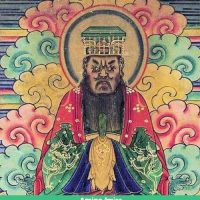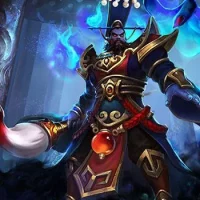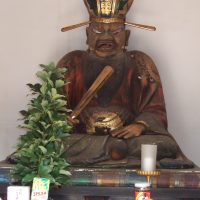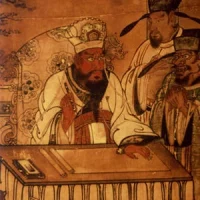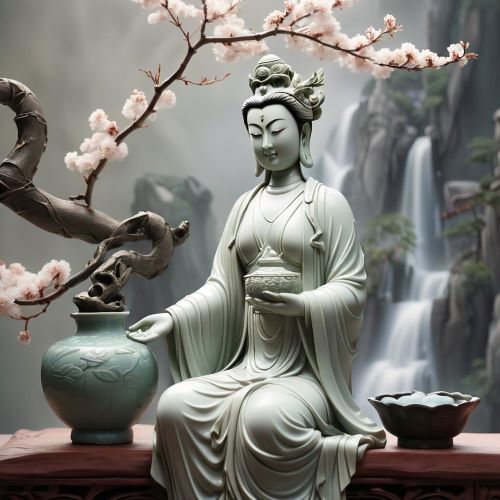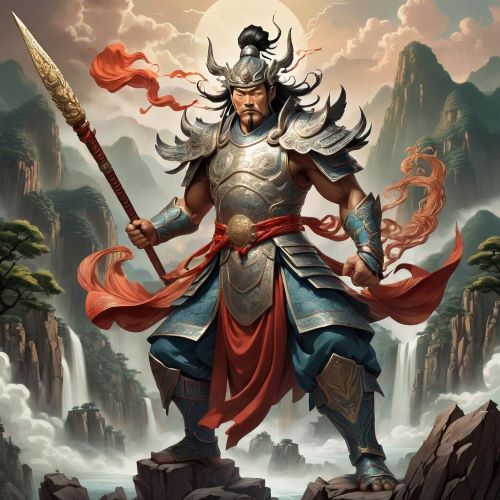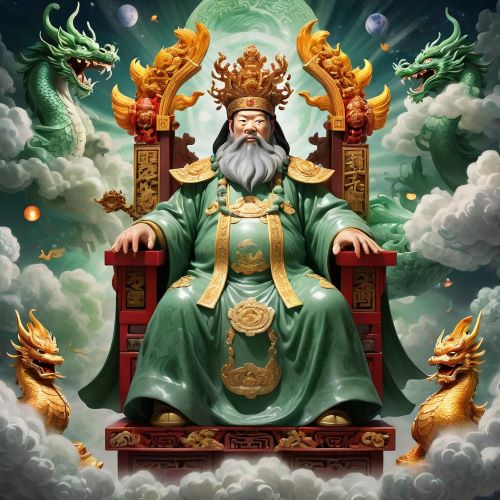Yan Wang : The King of Hell
Listen
At a glance
| Description | |
|---|---|
| Origin | Chinese Mythology |
| Classification | Gods |
| Family Members | N/A |
| Region | China |
| Associated With | Hell, Death, Underworld |
Yan Wang
Introduction
Yan Wang, also recognized as Yama, holds a prominent position within the tapestry of Chinese mythology. As the King of Hell and a deity associated with death, he governs the realms of the underworld with unwavering authority. Tasked with the solemn duty of assessing the souls of the departed, Yan Wang determines their ultimate destiny beyond mortal existence. In the intricate realms of Chinese mythology, Yan Wang emerges as a figure of both reverence and trepidation, presiding over Diyu—the ten-layered hell—where the souls undergo judgment and reconcile their karmic debts.
Physical Traits
Yan Wang is commonly portrayed as an austere and formidable presence, characterized by his commanding appearance. Typically depicted donning the attire of a judge, he is often depicted wearing a judge’s robe, cap, and wielding a judge’s staff, emblematic of his judicial authority. Traditionally, his visage is painted in hues of red, symbolizing his dominion and formidable power.
Throughout various artistic renditions, Yan Wang’s depiction may vary, yet certain fundamental traits endure. Frequently portrayed as a towering and imposing figure, he exudes an unmistakable air of authority. His countenance, whether crimson or emerald, mirrors the gravity of his judgments, accentuated by penetrating eyes that appear to penetrate the depths of the soul. A flowing beard, depicted in either white or black depending on the narrative, further enhances his aura of wisdom and agelessness. Draped in ornate robes, often adorned with motifs representing the underworld or dragons, he is sometimes crowned with a judge’s cap or a resplendent crown bearing the character signifying “king.”
Family
In the realm of Chinese mythology, Yan Wang’s familial structure diverges from human conventions. Instead of a traditional family unit, he finds kinship among other deities of the underworld. This assembly of deities forms Yan Wang’s ‘family’ in a broader sense, collaborating to uphold order within the depths of the underworld. While Yan Wang holds ultimate sovereignty, his operations do not unfold in isolation. His ‘family’—comprising fellow deities and assistants—fulfills pivotal roles in the administration of the underworld.
Meng Po, Yan Wang’s wife, assumes a significant position as overseer of the “Tea of Forgetfulness,” responsible for effacing memories of past lives before souls embark on their journey of reincarnation. Supporting this judicial framework are the “Ten Kings of Hell,” a council of judges, each entrusted with presiding over a distinct layer of Diyu, where they adjudicate various facets of a deceased individual’s existence. Furthermore, Ox-Head and Horse-Face, steadfast demons, undertake the roles of messengers and guardians, diligently ensuring order and discipline within the underworld.
This intricate network of divine entities collectively orchestrates the delicate equilibrium between the realms of life and death, symbolizing the interconnectedness of existence within the vast tapestry of Chinese mythology.
Other names
Yan Wang, a figure of intricate significance within Chinese mythology, is recognized by several alternative titles, each shedding light on different aspects of his divine essence. Among these appellations, “Yanluo Wang” stands out, signifying “King Yama of the Underworld.” Additionally, he is commonly referred to as “Yanluo,” a designation derived from the Sanskrit term ‘Yama Raja,’ translating to ‘King Yama.’ The multifaceted nature of Chinese mythology is evident in the multitude of names ascribed to Yan Wang.
His primary epithet, “Yan Wang,” directly translates to “King of the Underworld,” emphasizing his sovereign authority over the realms beneath mortal existence. “Yanluo Wang,” drawing from the Sanskrit “Yama Raja,” accentuates his association with Yama, the Hindu god of death. Intriguingly, in certain contexts, the name “Qinguang” may replace “Yan Wang,” denoting the specific judge presiding over the initial court of the underworld. These various names and titles enrich the nuanced tapestry of Yan Wang’s character within Chinese mythology, reflecting his multifaceted role and significance across diverse cultural contexts.
Powers and Abilities
In his capacity as the sovereign ruler of the underworld, Yan Wang commands unparalleled authority and might. Endowed with vast power, he possesses the formidable ability to adjudicate the souls of the departed, their fates hinging upon the sum of their deeds in life. Moreover, Yan Wang exercises omniscience, capable of discerning the intricacies of every soul that traverses into his dominion. His judgments are irrevocable, decreeing the paths of reincarnation or the sanctions to befall each individual.
Asserting his dominion over Diyu, Yan Wang’s influence permeates every corner of the realm. He commands legions of underworld denizens, marshaling them to execute his decrees with unwavering precision. Legends enshroud him with various implements of authority, including a fateful judgment brush dictating destinies and a tome of life chronicling the entirety of mortal actions. Beyond his judicial role, Yan Wang possesses the capacity to shape the very landscape of the underworld, summoning demons and orchestrating the terrain to uphold cosmic balance. Moreover, he holds the prerogative to bestow temporary clemency upon deserving souls, illustrating the breadth of his dominion and the weight of his decisions within the realms of myth and legend.
Modern Day Influence
Yan Wang’s legacy transcends the bounds of ancient mythology, permeating deeply into contemporary culture. A recurring figure in Chinese literature, cinema, and television, he is often depicted as an embodiment of justice and equity. Furthermore, his visage adorns various festivals and ceremonial rites, invoked to dispel malevolent spirits and safeguard against ill fortune.
From temples to folklore, Yan Wang’s presence resonates throughout the cultural landscape, serving as a poignant emblem of mortality and accountability for one’s actions. Whether in operas, novels, or cinematic productions, he is commonly portrayed as a stern yet righteous arbiter. Yet, his significance extends far beyond mere entertainment; Yan Wang embodies a profound cautionary narrative within Chinese society, emphasizing the imperative of ethical conduct and reverence for cosmic balance. Through his portrayal, individuals are reminded of the enduring consequences of their deeds, fostering a collective ethos of moral responsibility and harmony with the natural order.
Related Images
Frequently Asked Questions
What is lorem Ipsum?
I am text block. Click edit button to change this text. Lorem ipsum dolor sit amet, consectetur adipiscing elit. Ut elit tellus, luctus nec ullamcorper mattis, pulvinar dapibus leo.
What is lorem Ipsum?
I am text block. Click edit button to change this text. Lorem ipsum dolor sit amet, consectetur adipiscing elit. Ut elit tellus, luctus nec ullamcorper mattis, pulvinar dapibus leo.
What is lorem Ipsum?
I am text block. Click edit button to change this text. Lorem ipsum dolor sit amet, consectetur adipiscing elit. Ut elit tellus, luctus nec ullamcorper mattis, pulvinar dapibus leo.
What is lorem Ipsum?
I am text block. Click edit button to change this text. Lorem ipsum dolor sit amet, consectetur adipiscing elit. Ut elit tellus, luctus nec ullamcorper mattis, pulvinar dapibus leo.
What is lorem Ipsum?
I am text block. Click edit button to change this text. Lorem ipsum dolor sit amet, consectetur adipiscing elit. Ut elit tellus, luctus nec ullamcorper mattis, pulvinar dapibus leo.

